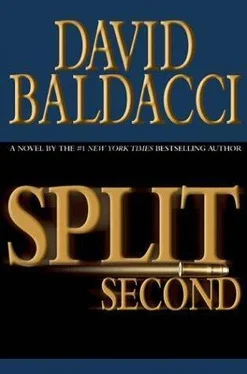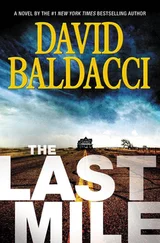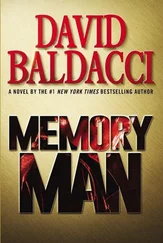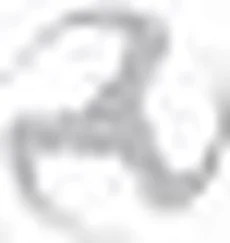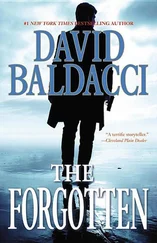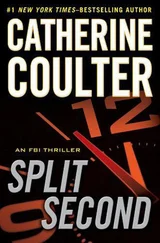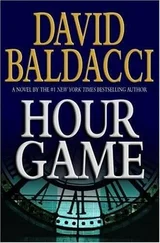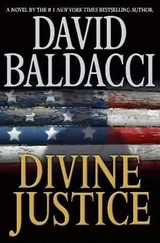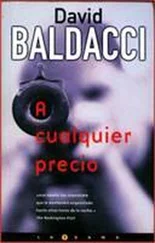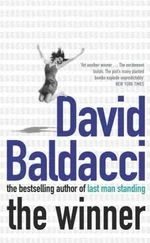"Any thoughts on what those warts might be?" asked Michelle.
Kate said nothing.
King said, "Look, the last thing we're aiming to do is drag up any more dirt on your father. I say, let him rest in peace. But if the man who talked to your father was responsible for his shooting Ritter, I don't see any reason why the man shouldn't suffer for it. And understanding your dad's past may help us find him. Because if I'm reading this right, this guy knew your father from the old days, and if he did, then he'd probably know what incident had tainted him enough to cut your dad off from the Harvards of the world, if indeed that was the case."
Michelle said, "Kate, you're the only hope we have with this. Unless you tell us what you know, it's going to be very tough for us to learn the truth. And I think you want to know the truth; otherwise, you wouldn't have called us."
Kate finally sighed and said, "Okay, okay, there were some things my mother said not too long before she killed herself."
"What were they, Kate?" Michelle prompted gently.
"She said my father was arrested during a demonstration. I think it was against the Vietnam War."
"What, for disorderly conduct or something?" asked King.
"No, for killing someone."
King leaned in close. "Who and how, Kate?" he said. "Everything you can remember."
"This is only from what my mother said, and she wasn't really all that clear about it. She was drinking heavily near the end of her life." Kate took out a tissue and dabbed at her eyes.
"I know this is hard, Kate, but it might help to get it out in the open," said King.
"From what I could gather it was a police officer or someone official like that. He was killed during this war protest that got way outof hand. In L.A., I think she said. My father was arrested for it. It actually looked really bad for him, and then something happened. My mother said some lawyers got involved on my dad's behalf, and the charges were dropped. And my mom said the police had trumped up the charges anyway. That they were just looking for a scapegoat, and my father was it. She was sure Dad hadn't done anything."
"But there must have been stories in the paper, or some scuttlebutt," commented Michelle.
"I don't know if it made the papers, but I guess there was a record of it somewhere because it obviously did hurt my dad's career. I checked into my mom's story. I confirmed that Berkeley let my dad graduate with his Ph.D. but did so very reluctantly. I guess they didn't have much choice; he'd already completed all the course work and his dissertation. The incident happened shortly before he graduated. But from what I could gather word spread in academic circles, and the places he applied to teach at after he graduated shut their doors on him. My mom said Dad bumped around here and there, scraping by before he got the job at Atticus. Of course, during those years he'd written all those books that were very well received in the academic community. Looking back, I think my dad was so bitter about being kept out of the top schools that even if any of them had come calling, he would have stayed at Atticus. He was a very loyal person, and Atticus had given him a shot."
King asked, "Any idea how your parents survived during the lean years? Did your mom work?"
"Here and there some, but nothing permanent. She helped my dad write his books, with research and such. I'm not really sure how they got by." She rubbed her eyes. "Why, what are you getting at?"
"I was just wondering," he said, "who these lawyers were who came in to represent your dad. Did your father come from money?"
Kate looked bewildered. "No, my father grew up on a dairy farm in Wisconsin. My mother was from Florida originally. They were both pretty poor."
"So it becomes even more puzzling. Why the lawyers coming to the rescue? And I wonder if your parents were getting by on money from an unknown source during the tough times."
"I guess it's possible," said Kate, "but I don't know where from."
Michelle looked at King. "Are you thinking the person who talked to Ramsey in his study that night might be connected to the L.A. incident?"
"Look at it this way. This thing happens in L.A. and Arnold Ramsey gets nailed. But what if he wasn't alone in it? What if some person who was well connected was also at fault? That would explain some fancy lawyers swooping in. I know lawyers-they don't usually work for free."
Michelle was nodding. "That might explain why the man mentioned Regina Ramsey. Maybe he was recalling the past fights against authority in getting Ramsey to pick up a gun and rejoin the struggle."
"God, this is all too much," said Kate. She looked like she might start crying. "My father was brilliant. He should have been teaching at Harvard or Yale or Berkeley. And then the police lie and his life is over. It's no wonder he rebelled against authority. Where's the justice in that?"
"There isn't any," answered King.
"I can still remember so vividly when I heard the news."
"You said you were in algebra class," said Michelle.
She nodded. "I went out in the hallway, and there was Thornton and my mother. I knew something bad had happened."
King looked startled. "Thornton Jorst was there with your mother? Why?"
"He was the one who told my mother. Didn't he tell you that?"
"No, he didn't," said Michelle adamantly.
"Why would he have known before your mother?" asked King quizzically.
Kate looked at him, puzzled. "I don't know. I assumed he heard about it on TV."
"What time did they come and get you out of class?" asked King.
"What time? I… I don't know. It was years ago."
"Think, Kate, it's really important."
She was silent for a minute and then said, "Well, it was in the morning, well before lunch, I know that. Say eleven o'clock or so."
"Ritter was killed at 10:32. There is no way the TV stations could have run a story with full particulars, including the identity of the assassin, barely thirty minutes later."
"And Jorst also had time to pick up your mother?" asked Michelle.
"Well, she wasn't living that far from where I went to school. You have to understand, Atticus isn't that far from Bowlington, about half an hour by car. And my mom lived on the way."
Michelle and King exchanged anxious glances.
"It couldn't be possible, could it?" said Michelle.
"What? What are you talking about?" asked Kate.
King rose without answering.
"Where are you going?" asked Kate.
"To pay Dr. Jorst a visit," he said. "I think there's a lot he hasn't told us."
"Well, if he didn't tell you about coming to see me at the school that day, maybe he didn't tell you about him and my mother."
King stared at her. "What about them?"
"Before she died she and Thornton were seeing each other."
"Seeing each other?" asked King. "But you said your mother loved your father."
"By then Arnold had been dead almost seven years. Thornton and my mother's friendship had endured and had turned into something else."
"Something else? Like what?" he asked.
"Like they were getting married."
Michelle had gotten only halfway through the Bob Scott file when she received the call from Kate. Since Michelle obviously wouldn't be getting back to it for a while, Joan had taken the box with her to the inn where she was staying and continued to go through it. After her last conversation with King, she needed something to take her mind off that very painful encounter.
When she opened the box and started sifting through its contents, she realized that Parks hadn't been joking: it was a mess. However, she dutifully turned every page, reading each document until it became clear it was not the right Bob Scott. After a couple of hours she called room service for a snack and a pot of coffee. She was going to be here a while, and she had no idea when King and Maxwell would be returning. She started to phone King but then decided against it.
Читать дальше
